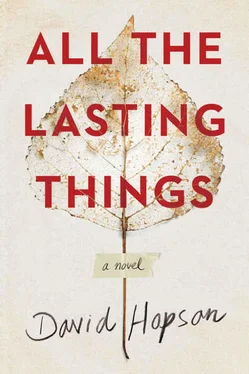He hesitated to use the word love . Where, except in the great, shattering romances of Britain and Russia and France, did anyone fall in love so fast? Still, toying with the idea, Benji thought I love you, I love you as he kissed Cat’s fluttering eyelids and practiced an increasingly deft, one-handed maneuver to unfasten her bra. Twice a week, Benji reported to Ernest Salter, whose parades down some of psychotherapy’s mustier corridors were a condition of the patient’s release, and agreed with the good doctor’s diagnosis: a budding romance would be… improvident. The idea of submitting to any therapist had terrified Benji, who doubted his ability to play before a professional the part of the emotionally unhinged bridge jumper. How to sustain the illusion that he’d meant to do what he’d done for anyone beyond his family (who, with the exception of Claudia, was only too happy to let him forget it)? But Salter’s inquisitive stare proved more kindly than penetrating, and soon Benji relaxed the need to temper his enthusiasm. “I think I love her,” he offered one day as an astonished non sequitur to a dream about a drowning elephant. To which Dr. Salter replied, in an unapologetic moment of Freudian devotion, “What does your mother make of this?”— this being the love, not the elephant.
Evelyn, six years her husband’s senior, congratulated herself for overlooking the couple’s considerable difference in age, unwilling to deprive her son the happiness that recent events convinced her he so seriously needed. Henry also approved, volubly and wholeheartedly, though his endorsement had little to do with Benji’s happiness. His radio had never really tuned to that channel, but he was glad to see Benji smitten with someone whose future promised more than a starring role in an exercise video.
“Don’t muck it up,” Henry said one morning, stabbing a piece of toast into an egg yolk and leveling the dripping point at his son. “I know you’re used to women with a higher nonsense-to-substance ratio, but this one has something to offer.”
“And what’s that?” Benji asked, glib but genuinely curious.
“She reads beyond the ingredient list on a Luna bar, for starters.”
“She’s an actor, Dad. You don’t like actors.”
“I don’t like disillusionment. There’s a difference.” He rapped his fork on the rim of his plate like a judge bringing his court to order. “We’re not starting down that road. I’m done with career counseling. I said she’s a keeper.”
Benji had the distinct impression that Cat could cut out his kidneys, sell them on eBay, and (as long as she could quote from Ulysses ) remain a keeper in Henry’s book. Not that it mattered. Cat was a keeper, though Benji’s reason for thinking so had nothing to do with Joyce.
He loved Cat’s passion. The way she’d swoon for a tulip but took lilies as a personal affront. Or how, in one breath, she’d condemn the “incarceration of the underclass” and then, in the next, devise cruel, practically medieval punishments for anyone caught answering his cell phone in a restaurant or wearing sunglasses indoors. “Unless you’re blind,” she reasoned, “or just coming from the ophthalmologist, there’s no excuse.” He loved her weakness for buttermilk biscuits, the diplomatic ease with which she handled his parents, and how, before kissing him good-bye, she grabbed a fistful of his hair and ungently pulled. He loved that she hated words that ended in y , that she made exceptions for adverbs but refused to say tasty even when something was. He loved her eyes. And the line of Whitman tattooed in typewriter font on the inside of her wrist. And the sudden, shocking devotion he’d won by false means.
She’d rented all four seasons of Prodigy while he was in the hospital, all five of his films, even A Hamster for Hannah , and discussed them without mockery, seriously, as a body of (her word) work that might one day have him thanking Uta Hagen from the dais. He plugged her into his Oscar speech, his Tony speech, his Vague but Meaningful Lifetime Achievement Award speech — the monologues he should have stopped rehearsing in his twenties but hadn’t — and she fit. I’d like to thank the members of the academy and all the people who helped put me here. Mom and, ahem, Dad and Blah and Blah and Blah. And Cat. My beautiful Cat. Ma chère Catherine. My Catchenka. No matter how he said it, she fit perfectly.
Part of Claudia’s refusal to play ATM and provide him with funds for a stay at the Motel 6 was her disapproval of how he’d spend his time.
“Vicodin and Voluptuous Vixens ,” she quipped.
She wasn’t wrong. (He’d once left the third installment of his favorite XXX franchise on a laptop he borrowed from her.) But Benji’s dream of making off to a hotel had as much to do with hoarding Cat for himself as it did with painkillers and porn. There, he imagined, they’d lie on a quilted coverlet and, day passing into night passing into day, float far beyond a sex life suitable for airing on a moderately racy Afterschool Special . If they didn’t have to worry about a sundowning Henry calling Cat by the name of his sixth-grade teacher, they might finally lose themselves and, carried away by something stronger than the polite little eddies of frottage and finger banging, discover one another. They’d be two explorers on a great, unsinkable raft, and nothing, not his incapacitating casts or the germiness and decidedly French fry smell of the bedspread, would hold them back.
But the dream of the hotel had evaporated with Claudia’s unequivocal “Forget it!” and every increasingly emphatic “No!” since. Benji withheld his disappointment from Cat, concerned that what he could only describe as his sister’s selfishness would glaringly expose his own, but he held out hope on another front: she’d leased the cottage on Saratoga Lake through the end of September, and although Benji had never stepped foot in it, her tour through the “Summer 2012” album on her smartphone convinced him that here was the perfect place to wall up with Ophelia and finally get down to “country matters.”
“We have two weeks before you have to be in New York. Two weeks without my parents hanging around.”
“Hanging around? Benji, it’s their house.” She moved her hand from his zipper and rapped a knuckle on the hard plastic casing that covered his leg. “Besides. You’re supposed to stay put.”
He stopped short of insisting. Already he’d sailed further with Cat than he once thought possible. Why press his luck and risk running aground the ambivalence that kept her from making an invitation in the first place? But the time for pressing his luck had come. It was Monday. If Benji wanted to play lord of Cat’s castle, he had to stop behaving as if rejection were a virus he feared catching and simply ask if he could move in.
He stood at the living room window, waiting for her to come. Now that the trial of lunch was over, now that Henry had convicted him of wearing his hair too long or never having read Montaigne, he could take up his afternoon post. He parted the curtain and looked out at the street. One of the prettiest Alluvia had to offer, the tall maples and gently sagging Queen Annes of the town’s forefathers, but quiet on a morning like this, everything still as a painted backdrop. Benji waited, watched. His mind lingered over the sight of a silver Mercedes parked across the street, a rare curbside flower not indigenous to these parts, but before he could bother to guess its origins, Judge Judy called him away. He hobbled back to the couch. The copy of To the Lighthouse that Cat had given him lay butterflied on the armrest. He tried ignoring “The Case of the Dented Bumper” and opened it to where he’d left off: Mr. Ramsay stalked across the lawn with the notion that a truly splendid mind could tackle the range of human thought, from A to Z, while his own mind, splendid enough but nevertheless limited, would never get farther than Q. Benji read,
Читать дальше












